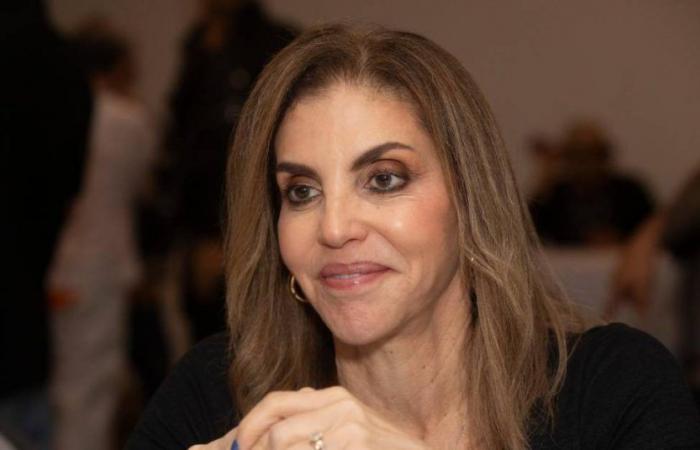07:53 PM
On July 20, Leila Cobo was recognized at the fifth edition of the Icono Awards with the Icono Máximo award, for her outstanding contribution to the Latin music industry. Her achievements and career have led her to be one of the most important journalists in Latin music.
Leila Cobo was born in Cali, is a journalist from the Javeriana University of Bogotá, studied piano performance from the Manhattan School of Music and has a master’s degree in communication from the Annenberg School of the University of Southern California.
As a pianist, he performed as a soloist with the Valley, Antioquia and Colombia Symphony Orchestras. As a journalist and writer she has published several books, including novels, biographies and specialized music books, but she is above all recognized for being the director of Latin and Spanish content for Billboard.
While passing through Medellín, EL COLOMBIANO spoke with her.
How would you describe what reggaeton has meant after so many years?
“I think that for the Latin music industry it was a turning point, because reggaeton truly globalized Latin music. Like it or not, but he did it. That music was exported very well. Daddy Yankee and J Balvin really had an impact that hadn’t happened before in Spanish, and then streaming came…”
Because? How do you explain that?
“Reggaeton was a genre that did not exist in English. You can’t even say it was hip hop in Spanish, because hip hop in Spanish already existed, but that reggaeton rhythm (the dembow) was new and I think that’s what helped. I have said this many times, but I love to say it, reggaeton is like the little black dress, it goes with everything.”
Now people are seeing regional Mexican music as a phenomenon, but that’s really not new…
“In the United States that was always the genre that sold the most and was most consumed until reggaeton arrived. Although for years reggaeton did not reach him either.”
We recommend you read: Do you remember Guallando? Merengue house is back with Fulanito
So what is happening with Mexican music is not a phenomenon…
“No, but the truth is that on a global level it is the first time I have seen it like this. We as Colombians love ranchera and all that music and we have always devoured it. That is not new here, but that this music is heard in Argentina, for example, that is new and I think that this goes hand in hand with the streaming phenomenon, that right now you can listen to music anywhere, but also because it is a young phenomenon…”
You have pointed out the fact that it is music with a band and that it has an attitude more similar to that of hip hop. What else do you think has given this new impulse to regional Mexican music?
“Reggaeton comes from being studio music. There is you, the computer, the beat and that has dominated for so long… suddenly music arrives that is totally alive, right? They don’t use beats, they have their whole band there and I think that difference in sound was what broke it. One always needs different sounds to make them break, so that there is a before and after. And I think that was it.”
Reggaeton in some way was already giving ground…
“I believe that this happens in any movement. It starts, it’s new, and suddenly everyone gets on the bus and everyone wants to do it and it becomes more and more difficult to do something that differentiates you.
Reggaeton is now at that moment, what are they going to do to make it sound different? So that each song doesn’t sound like the other 50 they release. There is a lot of that, that’s why there are always like 10 artists who are in the dome and then there are another 300…”
You may be interested in: Ritvales announces its official poster for the festival that will take place in November in Parque Norte in Medellín
Nowadays, anyone makes music… it seems easy, but how easy is it?
“It’s very difficult. And yes, everyone wants to make music and they do it, and I think there are momentary successes, but it’s very difficult to maintain that. And it’s something that requires you to perfect your craft.
The career of music for me is very similar to the career of an athlete. It’s not that you wake up and say, oh, I want to be Leo Messi. No.
Why is Leo Messi Leo Messi? Well because he is super good, yes, but also because he has trained his entire life. It’s not that he appeared on the court one day and said, here I am. I think the same thing happens with music. Now everyone wants to be Karol G, but she has truly comel like few people and this is the result.
And I think the worst thing that can happen and what is happening is that people want to become a musician or artist because they want to be famous or because they want to be featured. That’s not the reason. The people who are really good at this are people who can’t do anything else, because this is the only thing they are passionate about and if they don’t make music, they are going to die. “Those are the people who last, who endure.”
Speaking of Karol G, how do you explain this prominence of Medellín in music?
“I don’t know, but I would love to know and I think there has been a lot of talk about finding an identity after the time of Pablo Escobar, but I feel that deep down there was a group of people who started with the industry, with recording studios. and a movement was formed and I think that in Colombia that had not happened before. It’s been huge.
Karol talks a lot about that. She says that Nicky Jam shook her hand at the beginning of it, that everyone invited her to sing here and there. That is needed. I think for a long time, everyone was so focused on her stardom that a movement didn’t happen, and here it did. In Colombia there were loose stars, there was Shakira, Juanes and Vives, now, why this happened in Medellín I couldn’t tell you, let the paisas tell me that.”
You may be interested in: Adriana Lucía’s return to music is with cumbia rhythm
What is meant by the Latin market?
“For us, Latin music is music in Spanish. I can’t tell you how many times we talk about Rosalía and someone says… Oh, they don’t know that Rosalía, she is Spanish and not Latin. Obviously we know this, but to be on the Billboard Latin chart, the music has to be 51% in Spanish.”
That Latin market, which is so variable, does the Latin in Latin America change a lot in relation to the Latins in the United States?
“I believe that each market is a world. What you hear in Argentina is different from what you hear in Mexico, but there are things that are everywhere.
For example, Karol G and Daddy Yankee are everywhere. Now Ryan Castro is starting to achieve important things in the United States, but it is not as big as here.
Colombian popular music here is very big and there it is starting to work. It hasn’t burst yet, but it’s starting. I love it. “I think it’s a super interesting move.”
It is a very different popular than the Mexican regional…
“Very different. They are like cousins, but not. It is different and the United States chart is complicated. It’s hard to get in and hit. “Every country is a world.”
What do you think is missing in Latin music right now?
“We need the usual: new faces doing exciting things. You would think that with so many people making music there would be millions of new faces doing exciting things, but that’s not the case.
New artists are asked to be authentic, but that authenticity has also become a discourse that they repeat from others… they speak the same, they tell the same story…
“It’s hard to generate something new, and I think you can only generate something new when you’re doing things all the time. It’s not just one song, you have to experiment and go out and play and say, this doesn’t work, this does, here it’s better for me, here it’s worse.”
I think that the bad thing about networks and all that is that you start and from the first moment you are already outside and that does not give you time to cook yourself, so to speak, then things come out and they are raw… when they are still It’s not the time to go out. “Sometimes I see what they send me and I say, oh, they shouldn’t have sent me this like that.”
You are a great pianist, why did you stop playing and dedicate yourself to music through journalism?
“Because when I went to New York to study, I was surrounded by people who were all very good, because it was Manhattan School of Music, everyone was good.
So there you kind of have that reality check (confront yourself with reality) and in classical music in particular, which is not like popular music where, I don’t know…
In classical music that is not the case. Classical music is like ice skating, you know how to do the pirouette or not. So I said, I have a limit on this.”
It’s a great lesson for so many who want to make music…
“That’s what I said at the beginning. I think that if people get into this career because they want to be famous and that is not the reason for doing it. This is a career that is too demanding to get involved in, but when you do things well, success comes.”






